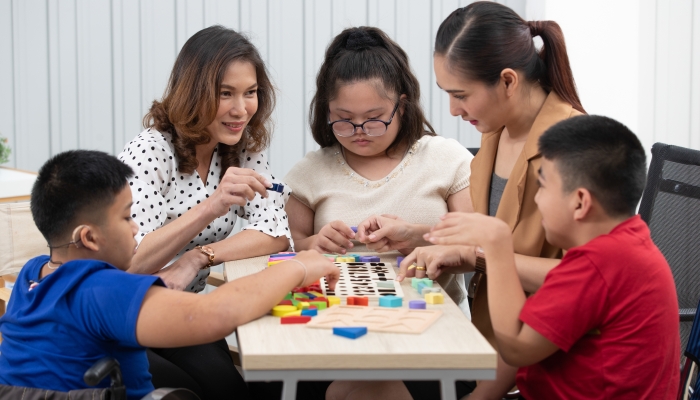Advocacy Strategies for Parents of Special Needs Children

- Parents can serve as self-advocates for their children to ensure they receive the special education they deserve.
- Finding special education services in your child’s school or community can significantly influence their future path to success.
- Parents can find special education advocates in their school district or through private practices.
Families of special needs children commonly feel uncertain about the future and the best ways to help their child. Learning how to navigate an unknown path can be overwhelming, especially when you already feel lost.
The importance of special needs advocacy begins at home, where parents are the most significant advocates for their children.
However, you can also find special education advocates in your community who can offer advice, introduce you to additional resources, and help support your child in their journey.
Knowledge is critical when determining the best way to advocate for your child and help them get the benefits they deserve.
Understanding Special Needs Advocacy

Generally, a special needs advocate is someone who ensures the needs of a child are met. Special education advocates help identify potential challenges or learning disabilities and how to address them.
A special education advocate can also help you navigate special education law, which dictates what your child is entitled to.
In addition, special education law helps determine:
- A child’s eligibility for special education services.
- Available services and accommodations.
- A parent’s rights regarding their child’s education.
Despite the availability of special education advocates, it isn’t always straightforward, and help isn’t necessarily easy to find.
The special education process generally involves an Individualized Educational Plan (IEP) meeting to develop a written plan for the child with disabilities, often led by local advocates.
The U.S. Department of Education11. A Guide to the Individualized Education Program. U.S. Department of Education. 2019. https://www2.ed.gov/parents/needs/speced/iepguide/index.html#:~:text=The%20IEP%20creates%20an%20opportunity,each%20child%20with%20a%20disability. considers the IEP meeting as the “cornerstone of a quality education for each child with a disability.”
The special education process isn’t always easy, and common challenges faced by special needs children and their parents include:
- Difficulty in accessing necessary services.
- A lack of advocates in their area.
- Physical and emotional strain.
- Feelings of isolation.
- Guilt over personal limits.
- Worry about the child’s future.
- Feeling like they don’t have a voice.
- Frustration with local schools.
- Judgment from other students.
What Can Parents Do to Advocate for Their Child with Special Needs?

An effective advocate connects with the teachers of their child’s school, who can help them understand potential disabilities or roadblocks they are facing.
Effective advocates understand the importance of early intervention and are on the frontlines to ensure the child receives the best education possible.
A 2022 study by Smith-Young et al. found that the pathway in a parent’s journey22. Smith-Young, J., Chafe, R., Audas, R., & Gustafson, D. L.. “I Know How to Advocate”: Parents’ Experiences in Advocating for Children and Youth Diagnosed With Autism Spectrum Disorder. Health Services Insights. 2022;15, 117863292210788. https://doi.org/10.1177/11786329221078803 includes:
- Expressing concerns.
- Seeking help, assessment, and diagnosis.
- Acquiring services.
- Removing barriers.
- Developing advocacy skills.
What parents can do to advocate for their child with special needs:
- Attend IEP meetings to review and monitor your child’s progress.
- Connect with other parents of special needs children to learn valuable practices and tactics.
- Find local organizations in the community that help children with disabilities.
- Hire an attorney if you feel your child’s school isn’t adhering to state laws and is being under-served.
- Strive to have your child in the least restrictive environment by allowing them in class with other students as much as possible.
- Be your own special education advocate and find resources to help your child daily.
You may also want to discuss your school’s procedure for special needs students regarding standardized testing. Research has shown that children with special needs struggle with standardized testing, whether it’s the time restriction or difficulty reading the questions, which results in inaccurate test scores.
Why Is It Important to Advocate for Children With Special Needs?

One of the most important reasons to advocate for a child with special needs is to help improve their quality of life. If we don’t advocate for our children, who will?
Advocating for your children and providing early intervention can significantly impact your child’s progress long-term and set them up for success.
If your school district isn’t giving your child the special education services they deserve, you may have to attend a due process hearing. The hearing is to help resolve any disputes between the parents and the school.
Each state has different laws, so the exact process may vary depending on where the child lives. However, students should be offered special services if they qualify.
Knowing your specific state’s laws will come in handy when determining what resources are available for your family.
How Can Effective Advocacy Strategies Benefit Special Needs Children and Their Parents?

Effective advocacy strategies are essential for families because they offer support and training for children and their parents.
While it’s common to find social anxiety in special needs kids, it’s vital to help address specific issues where they have a more significant impact on the child.
Families with a special needs child can learn how to advocate together and organize meetings to educate each other on the child’s progress.
When the whole family shows interest in the child’s well-being, there’s a greater sense of cohesiveness and understanding. Remember, there’s no such thing as too much knowledge.
In addition, educating the family about your child’s specific disability allows everyone to research and better understand their condition.
Building a Strong Support Network to Advocate for Special Needs Children

Parents know it takes a village, and that goes for special education advocacy too. Whether it’s through a local organization or your child’s school, support is available.
Providing advocates and a strong support network are some of the best things parents can do for their children with disabilities.
Remember, people can only do so much alone, and asking for help is always okay.
Tips for building a solid support network include:
- Find parent support groups with families going through a similar process.
- Research your child’s disability and learn what tactics you can provide at home.
- Engage all family members in the advocating process.
- Understand what your school system offers for special needs children.
- Attend parent training classes that provide services and other resources.
- Utilize social media and online communities.
- Engage with local advocacy organizations.
- Attend seminars and workshops to further educate yourself about childhood disabilities.
- Connect with schools in the area to see what programs they offer.
If you’re interested in finding local groups, check with your library or local community center for additional resources.
Remember to engage in self-care, especially if you feel overwhelmed dealing with the chaos of everyday life. You may not feel like you live an enviable life sometimes, but never forget you mean the world to your child.
You play an important role for your child, but learning to care for yourself on a daily basis is also essential. You are only one person and can only do so much.
FAQs
How do I know if schools or institutions promote inclusion and acceptance for children with special needs?
You should never hesitate to ask your child’s school about the services they have for special needs. The Individuals With Disabilities Act33. Individuals with Disabilities Education Act (IDEA). U.S. Department of Education. https://sites.ed.gov/idea provides free appropriate public education to eligible children with disabilities and ensures special education and relevant services to those children.
What are my options if my child experiences discrimination or exclusion due to their special needs in the school district?
You should always speak with the teachers or principal at your child’s school if you feel they are being discriminated against because of their special needs. If your child has issues with other students, you should go directly to the administration.
Remember, it’s unlawful for a school to discriminate against individuals with disabilities according to the Americans with Disabilities Act. You can always file a complaint44. US Department of Education. How to File a Discrimination Complaint with the Office for Civil Rights. US Department of Education. 2023. https://www2.ed.gov/about/offices/list/ocr/docs/howto.html with the US Department of Education if you feel that your child is experiencing discrimination at school.
How can I manage the emotional and logistical challenges of advocating for my child?
Preparing for emotional and logistical challenges is vital as a special education advocate. You can offer emotional support to your child while everyone is still learning how to approach your child’s specific needs best.
As a parent, what can I do for my well-being while advocating for special education services?
Take time daily to clear your mind and take a deep breath. Don’t be afraid to talk to a therapist if you’re overwhelmed as you advocate for your child. Remember, your well-being is just as important as your child’s.
References
- A Guide to the Individualized Education Program. U.S. Department of Education. (2019, August 30). https://www2.ed.gov/parents/needs/speced/iepguide/index.html#:~:text=The%20IEP%20creates%20an%20opportunity,each%20child%20with%20a%20disability.
- Smith-Young, J., Chafe, R., Audas, R., & Gustafson, D. L. (2022). “I Know How to Advocate”: Parents’ Experiences in Advocating for Children and Youth Diagnosed With Autism Spectrum Disorder. Health Services Insights, 15, 117863292210788. https://doi.org/10.1177/11786329221078803
- Individuals with Disabilities Education Act (IDEA). U.S. Department of Education. (n.d.). https://sites.ed.gov/idea
- US Department of Education (ED). (2023, March 8). How to File a Discrimination Complaint with the Office for Civil Rights. US Department of Education. https://www2.ed.gov/about/offices/list/ocr/docs/howto.html

Related Posts

Eye Conditions and Syndromes, Visual Impairment
Neuralink Announces Plans to Restore Sight to the Blind with Brain Chip
Elon Musk’s company Neuralink has announced plans to begin human trials of its new “Blindsight” brain chip by the end of 2025.

Special Needs
5 Spring Cleaning Tips for Families of Children with Disabilities
Spring cleaning is an opportunity to create a more accessible, organized, and supportive space for your child with disabilities. Declutter, deep clean, and refresh!

Visual Impairment
The Gift of Understanding: How a Young Child Helps His Blind Father Navigate Life
When a parent is blind, it’s natural for people to wonder how their sighted child will adapt. Will they struggle to understand their parent’s needs? Will they feel burdened by...